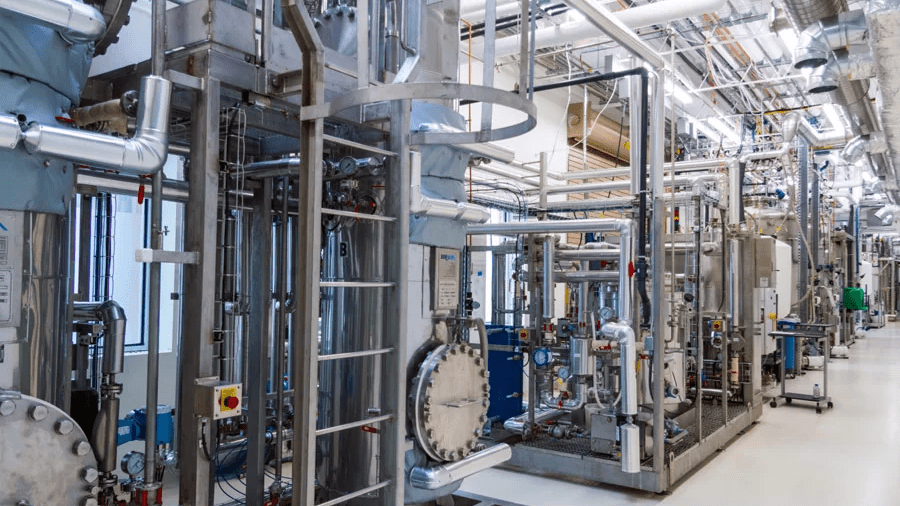
The Covid-19 pandemic triggered a domestic emergency response from public agencies and private companies across various industries to develop, manufacture, ship, and distribute products to address a global health crisis. This story illustrates (1) the critical and accelerated advancements that the fermentation industry contributed to the production of Covid-19 diagnostic kits and vaccines, and (2) the importance of fermentation moving forward in the prevention and mitigation of outbreaks related to illness or contamination.
The Covid-19 pandemic resulted in unprecedented demand for enzymes essential for innovative point-of-care diagnostic kits and mRNA vaccines. These enzymes are utilized to test specimens in kits and to produce mRNA that triggers the intended immune response in vaccine recipients.
As diagnostic kits and vaccines were being designed and produced to combat Covid-19, molecular reagent distributors could not meet the unprecedented increase in demand for such enzymes. Supply-chain delays and shortages prevented companies from increasing production in a timely manner. Luckily, fermentation service providers, like Fermatix, already had the resources to pivot business models and produce enzymes with almost no delay.
Without the fermentation industry producing these enzymes as quickly as it did, community transmission rates would have continued to rise, the economy would have been further damaged, and even more lives would have been lost or negatively impacted due to a lack of diagnostic kits and vaccines. But unlike other Covid-19 pandemic products that experienced only a temporary burst of demand, enzyme production remains critical.
From a vaccination perspective, the Covid-19 products from Pfizer-BioNTech and Moderna were the first mRNA vaccines approved by the FDA. Given the success of these novel mRNA vaccines during the Covid-19 pandemic, enzymes will remain in high demand given the advantages of replicating this method of vaccination for other diseases and illnesses. According to the National Library of Medicine:
mRNA technology presents several advantages that makes it an attractive alternative over traditional vaccines or even DNA vaccines. Unlike attenuated or inactivated vaccines, mRNA is precise as it will only express a specific antigen and induce a directed immune response. Additionally, it promotes both humoral and cellular immune response and induces the innate immune system. Compared with DNA-based vaccines, mRNA is more effective, since expression does not require nuclear entry, and safer, since the probability of random genome integration is virtually zero. Additionally, expression of the coded antigens is transient since mRNA is quickly degraded by cellular processes, with no traces found after 2–3 days. The flexible nature of the mRNA vaccine platform is also advantageous for manufacturing since a change in the encoded antigen does not affect the mRNA backbone physical–chemical characteristics, and hence allow production to be standardized. Additionally, since production is based on an in vitro cell-free transcription reaction, safety concerns regarding the presence of cell-derived impurities and viral contaminants commonly found in other platforms are minimised.[1]
The Covid-19 pandemic has both reaffirmed and accelerated the need for sophisticated fermentation products in the pharmaceutical and biotechnology fields. Critical supplies of enzymes made by fermentation are helping people and industries across the globe address a myriad of issues that can now be mitigated thanks to the technological and manufacturing advances of the fermentation industry during the Covid-19 pandemic, including:
- Food testing and contamination mitigation;
- Disease diagnosis, prevention and treatment; and
- Agricultural production of livestock and crops.
Over two years since delivering its first batch of enzymes essential for diagnostic kits and mRNA vaccines, Fermatix continues to fulfill Covid-19 orders and to provide other fermentation and downstream services. Based on the significant and widespread benefits of diagnostic kits, mRNA vaccines, and disaster-prevention planning, the fermentation industry is not slowing down anytime soon.
To learn more about Fermatix, please visit: https://www.fermatix.com/.
[1] Rosa, Sara, et. al, (24-Mar-2021), mRNA vaccines manufacturing: Challenges and bottlenecks, Elsevier Public Health Emergency Collection, 2021 Apr 15; 39(16): 2190–2200, found at: https://www.ncbi.nlm.nih.gov/pmc/articles/PMC7987532/ (accessed on 01-Nov-2022).
About the Author:

T. Craig Masterman
Craig is the President & CEO of Fermatix. Craig has 15 years of experience in building fermentors and working with customers to scale their fermentation processes. He has a Ph.D. from MIT and over 120 patents and publications.
In 2020, world-class molecular reagent companies began approaching Fermatix to produce enzymes needed for diagnostic kits and mRNA vaccines at its 42,000 square foot facility north of Boston, which is now dedicated to highly technical small and large-scale fermentations and downstream processing.
Craig can be contacted using the following link: https://www.fermatix.com/contact-us